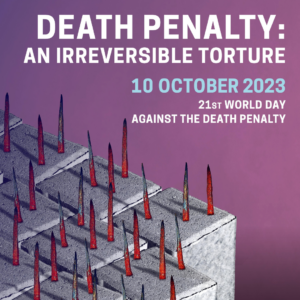
Is Zim ready to abolish death penalty?
- DPP in the Media
- 15 May 2019
As reported by the News Day, 15 May 2019 (read original article)
May 2019 marks the anniversary of the publication of 12 Years Without an Execution: Is Zimbabwe Ready for Abolition?, an independent survey of public attitudes towards capital punishment commissioned and published by the Death Penalty Project in association with Veritas. Since the release of the report, there appears to have been further progress towards the abolition of the death penalty in Zimbabwe.
The President, Emmerson Mnangagwa, himself has made his support for abolition very clear. In January 2019, we also understand that the Justice, Legal and Parliamentary Affairs ministry made recommendations to Cabinet to abolish the death penalty — with Justice minister Ziyambi Ziyambi citing evidence of both the lack of increased deterrence, and the inevitability of error, to support these proposals. Encouragingly, this important step was taken despite the disappointing decision made by the government to vote against the United Nations (UN) resolution on a worldwide moratorium on the death penalty only a month prior, in December 2018.
No executions have taken place in Zimbabwe since July 2005, almost 14 years ago. However, Amnesty International reports that at least five people were sentenced to death in 2018, with 81 people under sentence of death at the beginning of this year. The on-going use of the death penalty remains an issue in Zimbabwe, with public opinion commonly cited as a key barrier to abolition. The findings of the “12 Years” report challenge this perspective.
Until this research was undertaken, no examination of public attitudes towards the death penalty had been carried out in Zimbabwe since the constitution-making process in 1999. At this time, the public were only asked one binary question – whether or not they supported or opposed capital punishment. We know from previous research that such binary questions fail to uncover important nuances or gauge the extent of public attitudes. As such, there was a clear need for further investigation of public attitudes towards the death penalty. As expected, the in-depth research uncovered important findings that are essential to any discussion on the future of the death penalty in Zimbabwe.
While a small majority of Zimbabweans do support retention of the death penalty, this support was not particularly strong. Only 41% thought that Zimbabwe should “definitely” retain the death penalty, with 20% feeling it should “probably” be kept – a combined total of only 61% (compared with 33% in favour of abolition). In addition, the report also identified that public opinion, whether for or against abolition, was generally not based on deep knowledge of the subject matter. Of those surveyed, 83% were unaware that Zimbabwe had not conducted an execution for over a decade. Moreover, when presented with a range of typical case scenarios, five out of six respondents rejected its use. This demonstrates that support for capital punishment, in practice, is far lower than it first appears in the abstract.
When exploring the reasons for the support of the death penalty, it was striking that the “eye for an eye” argument did not weigh heavily with the Zimbabwean public. Only 14% of retentionists supported the death penalty for retributive reasons, standing in stark comparison to similar studies conducted in Trinidad, Ghana, and other countries, where this tended to be one of the most popular arguments in favour of the death penalty. Further questioning found that public opinion was not deeply entrenched, with 92% of respondents considering that policies other than “more executions”— such as “better moral education” or “reducing poverty” — would be more effective in reducing violent crime. Thus, while on the surface, public support for capital punishment might appear strong, the survey clearly shows that this is not the whole picture. Attitudes towards the death penalty are highly qualified and vary according to different assumptions, information and situations.
Perhaps, the most significant finding of the study was that 80% of the respondents, who were in favour of retention, would accept abolition, if it were to become government policy. This means that people look to the government to take the lead on the issue.
While public opinion is a factor that should be considered in the debate, it is ultimately the responsibility of the country’s political leadership to educate and lead the national discussion. This finding demonstrates that principled leadership by Members of Parliament and other leaders would be welcomed by the Zimbabwean public.
Until formal steps are taken by policymakers to abolish capital punishment in law, people will continue to be sentenced to death, and the risk of future executions being carried out in Zimbabwe will inevitably persist.
It is, therefore, imperative that abolition of the death penalty is championed by political leaders and is based on a rational and informed appreciation of the facts.
Many countries that are now the most ardent supporters of abolition worldwide abolished the death penalty in the face of significant public opposition. We know from these examples that public attitudes evolve, and where political leadership is exercised to abolish the death penalty, the public does — in time — come to support the abolitionist position.
Support for the death penalty is reducing worldwide, with over two-thirds of countries having now abolished capital punishment in law or in practice. Sub-Saharan Africa has particularly seen positive trends in recent years — with Burkina Faso, Guinea and Benin all having abolished the death penalty since 2016.
Over the past year, Zimbabwean policymakers have indicated their readiness to take significant steps in the same direction.
We would encourage Zimbabwe to join the majority of the world’s nations in removing execution as punishment from its laws. 12 Years Without an Execution demonstrates that the public will accept and embrace its leaders taking this important step.
Related media articles:
- ‘Is Zim ready to abolish death penalty?’, Zim 24 News, 15 May 2019



















